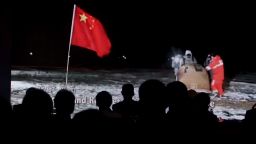A crew of three Chinese astronauts has had their return to Earth postponed due to concerns that their spacecraft may have been damaged by space debris. The astronauts, Chen Dong, Chen Zhongrui, and Wang Jie, were initially scheduled to return on March 15, 2024, following a six-month mission aboard the Shenzhou-20 spacecraft.
The decision to delay their journey was made by the China National Space Administration (CNSA), which stated that an analysis of the impact and a risk assessment are currently underway. The agency has not provided specific details regarding any potential damage to the spacecraft or an estimated timeframe for the evaluation.
Extended Stay in Space
The trio of taikonauts had already completed a handover of operations at the Tiangong Space Station, known as the “Heavenly Palace,” to a new crew just prior to their planned return. The astronauts launched from the Inner Mongolia Autonomous Region in April 2023 and have been part of China’s rapidly advancing space program, which has seen significant milestones in recent years.
The delay follows shortly after China celebrated the successful launch of its Shenzhou-21 mission, which transported a new cohort of astronauts, including Wu Fei, who has been recognized as potentially the youngest astronaut from China to journey into space.
During a handover ceremony broadcast by state-owned CCTV, Chen Dong expressed the significance of their mission, stating, “We are about to return to Earth, and now I am handing over the hatch key that symbolizes the right to maintain operations on this Chinese space station to you.”
Global Space Race Intensifies
The postponement has raised concerns regarding astronaut safety and health, as the CNSA prioritizes thorough assessments before allowing the crew to return. This incident highlights the increasing complexity and risks associated with human spaceflight.
China’s space program has gained international attention not only for its ambitious projects but also for its recent achievements, including a record-setting spacewalk that surpassed the previous U.S. record by lasting over nine hours. Furthermore, the nation plans to welcome an astronaut from Pakistan to Tiangong next year, marking a significant step toward international collaboration in space exploration.
These advancements have provoked responses from other nations, particularly the United States, which is working to return astronauts to the Moon. The U.S. has faced challenges of its own; last year, astronauts Suni Williams and Butch Wilmore experienced an extended stay in space due to a malfunction of their return spacecraft, the Boeing Starliner, which delayed their homecoming for over nine months.
As the situation unfolds, the international space community watches closely, noting the implications of these developments for future space missions and collaborations.





